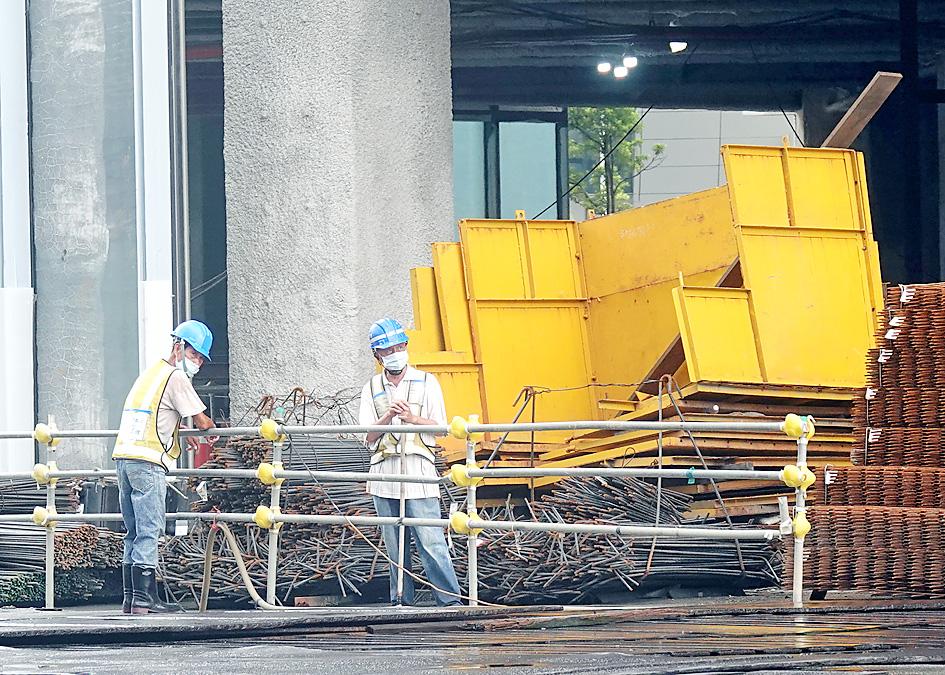Business confidence last month weakened slightly among Taiwan’s manufacturers as demand diminished for devices used in distance learning and remote working, a survey released yesterday by the Taiwan Institute of Economic Research (TIER, 台灣經濟研究院) found.
The business sentiment gauge for the manufacturing sector fell 1.99 points to 101.64 — a fifth consecutive month of decline as the stay-at-home economy loses momentum — ushering in an inventory correction cycle for some local electronics suppliers, the Taipei-based think tank said.
That accounted for why many firms said they were neutral or had turned cautious regarding their business prospects over the next six months, the monthly report said.

Photo: CNA
The number of companies with a rosy outlook shed 3.5 percentage points to 31.3 percent, while the number of those with negative views gained 4 percentage points to 14.9 percent, the report said.
Firms selling DRAM chips, smartphone cameras and LCD panels reported inventory adjustments, TIER said, adding that the adjustments were necessary even though sales prices for semiconductors climbed higher due to lingering supply tightness.
Firms making chemical and plastic products were also looking at a business slowdown, it said.
By contrast, the business confidence reading for service providers increased 2.11 points from a month earlier to 95.38 — a second consecutive month of growth, it said.
Most restaurants and retailers saw an improvement in business after health authorities eased capacity restrictions and social distancing, it said, adding that most securities firms reported a downturn in business due to volatility on the TAIEX.
Department stores, hospitality providers, banks and insurance firms share a positive outlook, expecting revenue to rise this quarter ahead of the peak season, it said.
Revenue would also receive support from anniversary sales and the government’s Quintuple Stimulus Vouchers program, in which each voucher packet is valued at NT$5,000, it added.
Firms in other sectors are looking at flat sales, it said.
The business confidence of construction firms and real-estate brokerages rose to 110.82, up 3.78 points from August, encouraged by a recovery in the price of concrete due to housing sales, it said.
Developers showed their confidence by increasing the number of new projects for the fall sales season, the institute said.
Buyer interest also picked up after the local COVID-19 situation eased, it said.
Excessive liquidity and ultra-low interest rates have lent support to the property market, despite unfavorable government measures meant to rein in property price hikes and loose lending, it said.
Most developers and property brokers are confident that the market would continue to see a recovery, with only a slight chance of price corrections, it said.

NEW IDENTITY: Known for its software, India has expanded into hardware, with its semiconductor industry growing from US$38bn in 2023 to US$45bn to US$50bn India on Saturday inaugurated its first semiconductor assembly and test facility, a milestone in the government’s push to reduce dependence on foreign chipmakers and stake a claim in a sector dominated by China. Indian Prime Minister Narendra Modi opened US firm Micron Technology Inc’s semiconductor assembly, test and packaging unit in his home state of Gujarat, hailing the “dawn of a new era” for India’s technology ambitions. “When young Indians look back in the future, they will see this decade as the turning point in our tech future,” Modi told the event, which was broadcast on his YouTube channel. The plant would convert

‘SEISMIC SHIFT’: The researcher forecast there would be about 1.1 billion mobile shipments this year, down from 1.26 billion the prior year and erasing years of gains The global smartphone market is expected to contract 12.9 percent this year due to the unprecedented memorychip shortage, marking “a crisis like no other,” researcher International Data Corp (IDC) said. The new forecast, a dramatic revision down from earlier estimates, gives the latest accounting of the ongoing memory crunch that is affecting every corner of the electronics industry. The demand for advanced memory to power artificial intelligence (AI) tasks has drained global supply until well into next year and jeopardizes the business model of many smartphone makers. IDC forecast about 1.1 billion mobile shipments this year, down from 1.26 billion the prior

People stand in a Pokemon store in Tokyo on Thursday. One of the world highest-grossing franchises is celebrated its 30th anniversary yesterday.

Zimbabwe’s ban on raw lithium exports is forcing Chinese miners to rethink their strategy, speeding up plans to process the metal locally instead of shipping it to China’s vast rechargeable battery industry. The country is Africa’s largest lithium producer and has one of the world’s largest reserves, according to the US Geological Survey (USGS). Zimbabwe already banned the export of lithium ore in 2022 and last year announced it would halt exports of lithium concentrates from January next year. However, on Wednesday it imposed the ban with immediate effect, leaving unclear what the lithium mining sector would do in the